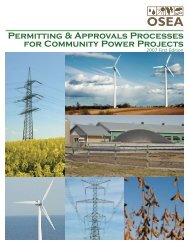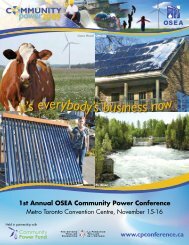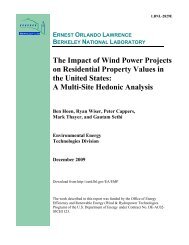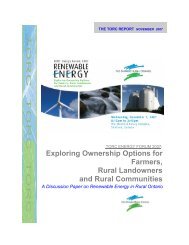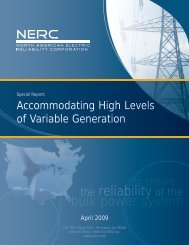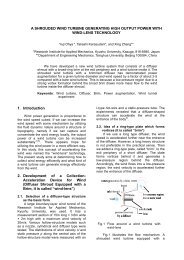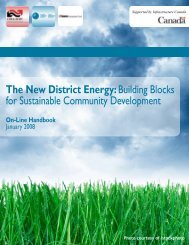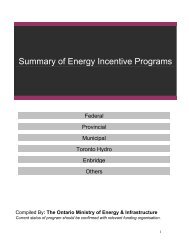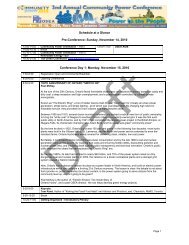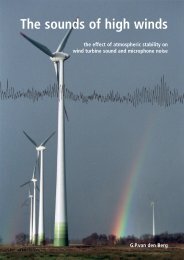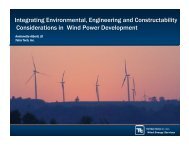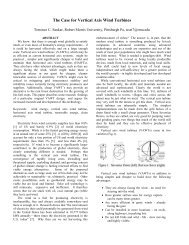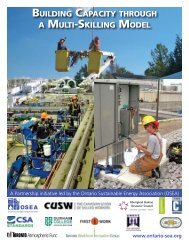Haubenschild Farms Final Report - The Minnesota Project
Haubenschild Farms Final Report - The Minnesota Project
Haubenschild Farms Final Report - The Minnesota Project
Create successful ePaper yourself
Turn your PDF publications into a flip-book with our unique Google optimized e-Paper software.
<strong>The</strong> <strong>Minnesota</strong> <strong>Project</strong> August 2002<br />
expanding feedlot operations. He was also aware of the potential of anaerobic digesters to<br />
reduce these problems while at the same time producing energy and providing other<br />
benefits.<br />
<strong>The</strong> Opportunity<br />
In order to see if an anaerobic digester<br />
would work at his farm, Dennis submitted<br />
an application for consideration as an<br />
AgSTAR Charter Farm, and after<br />
completing a pre-feasibility assessment was<br />
one of 13 farms selected. AgSTAR is a<br />
national program, sponsored jointly by the<br />
Environmental Protection Agency, the<br />
Department of Energy and the Department<br />
of Agriculture. <strong>The</strong> Charter Farm Program<br />
was designed to facilitate demonstration of<br />
appropriate digester systems at various<br />
livestock farms. As a Charter Farm,<br />
AgSTAR provided <strong>Haubenschild</strong> <strong>Farms</strong><br />
design and operational assistance in<br />
building their digester. AgSTAR<br />
contracted with RCM, a company with a proven track record of building successful on-farm<br />
digesters, to assist with the project. Mark Moser was the engineer, while RCM’s Richard<br />
Mattocks handled all onsite issues and helped to build the system.<br />
<strong>The</strong> <strong>Haubenschild</strong>s: Dennis, Bryan, Marsha and Tom (l to r)<br />
<strong>The</strong> farm also required a feedlot permit, including a manure management plan. <strong>The</strong><br />
<strong>Minnesota</strong> Pollution Control Agency granted the permit. <strong>The</strong> digester qualified as manure<br />
storage, reducing the size of the storage pond required for storing digested manure. Even<br />
with this assistance, there were still barriers to be overcome, since traditional lending<br />
agencies in <strong>Minnesota</strong> are reluctant to provide the full financing for such projects, and<br />
Dennis needed help in securing financing.<br />
At this point the unique opportunities of the digester project at <strong>Haubenschild</strong> <strong>Farms</strong> were<br />
brought to the attention of several <strong>Minnesota</strong> governmental and non-profit agencies. <strong>The</strong><br />
Onanegozie Resource Conservation and Development Council, <strong>The</strong> <strong>Minnesota</strong> <strong>Project</strong>,<br />
<strong>Minnesota</strong> Department of Commerce, <strong>Minnesota</strong> Office of Environmental Assistance, and<br />
<strong>Minnesota</strong> Department of Agriculture joined together to assist with the <strong>Haubenschild</strong><br />
<strong>Farms</strong> project. <strong>The</strong>se agencies saw the unique potential of manure digesters to mitigate<br />
negative environmental impacts while providing a source of renewable energy and<br />
promoting sustainable economic development. <strong>The</strong>y agreed to help with the financing if<br />
the <strong>Haubenschild</strong> <strong>Farms</strong> project could be studied to determine its feasibility for other farms<br />
in <strong>Minnesota</strong>.<br />
12




